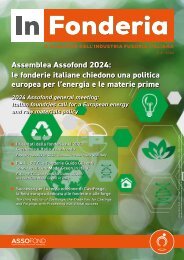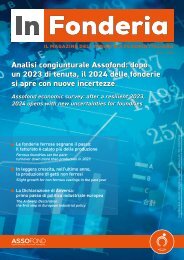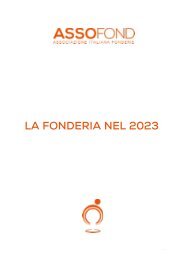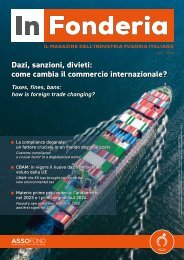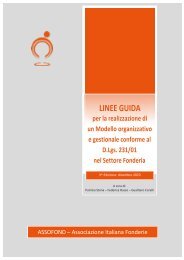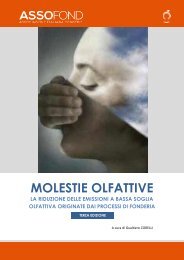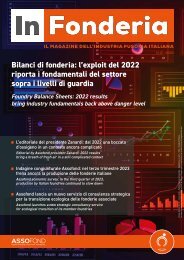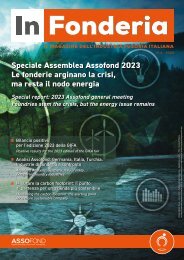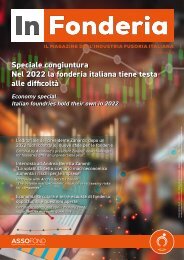In Fonderia 2 2024
Secondo numero del 2024 di In Fonderia
Secondo numero del 2024 di In Fonderia
Create successful ePaper yourself
Turn your PDF publications into a flip-book with our unique Google optimized e-Paper software.
AMBIENTE E SICUREZZA<br />
dello di organizzazione e gestione, una serie di<br />
indicazioni e misure specificatamente pensate<br />
in relazione alle attività di fonderia, ritenute in<br />
astratto idonee a rispondere alle esigenze delineate<br />
dal decreto 231/01, comunque adattabili<br />
alla specificità della singola impresa.<br />
LA TERZA EDIZIONE DELLE LINEE GUIDA DI<br />
ASSOFOND<br />
Le nuove linee guida Assofond, curate come le<br />
precedenti dalle avv. Patrizia Stona e Federica<br />
Russo, vedono la luce a quattro anni di distanza<br />
dalla precedente edizione per allinearsi alle<br />
evoluzioni che hanno interessato la normativa<br />
dal novembre 2019 in poi.<br />
<strong>In</strong> questo periodo di tempo, infatti, sono state<br />
introdotte nuove fattispecie di reati nei seguenti<br />
ambiti:<br />
• reati tributari;<br />
• reati di contrabbando;<br />
• delitti in materia di strumenti di pagamento<br />
diversi dai contanti;<br />
• altre fattispecie in materia di strumenti di<br />
pagamento diversi dai contanti;<br />
• riciclaggio di beni culturali e devastazione e<br />
saccheggio di beni culturali e paesaggistici;<br />
• delitti contro il patrimonio culturale;<br />
• frode in competizioni sportive, esercizio abusivo<br />
di gioco o di scommessa e giochi d’azzardo<br />
esercitati a mezzo di apparecchi vietati.<br />
<strong>In</strong>oltre, con riferimento al cosiddetto “Whistleblowing”,<br />
ossia allo strumento di segnalazione<br />
di attività illecite nell’amministrazioni pubbliche<br />
o in aziende private, il D.lgs. 10 marzo<br />
2023 n. 24, le cui disposizioni sono effettive<br />
dal 17 dicembre 2023, ha apportato modifiche<br />
all’art. 6 del D.lgs. 231/01 con particolare riferimento<br />
ai sistemi di segnalazione di attività illecite,<br />
in quanto la società, nei modelli organizzativi<br />
e gestionali, deve predisporre dei canali<br />
di segnalazione interna, prevedere misure per<br />
evitare ritorsioni e definire un sistema disciplinare<br />
per punire gli illeciti. Con riferimento a<br />
ciò si suggerisce alle società di fare riferimento<br />
alle linee guida in materia emanate dall’Autorità<br />
Nazionale Anti Corruzione (ANAC). Lo<br />
strumento normativo, già presente all’interno<br />
del D.lgs. 231/01, tutela il Whistleblower (letteralmente:<br />
soffiatore nel fischietto), cioè colui<br />
che segnala o denuncia l’attività illecita commessa<br />
all’interno di un’organizzazione pubblica<br />
o privata, da possibili ritorsioni.<br />
that could be considered to “exempt” foundries<br />
from the liabilities defined by decree 231/01, in<br />
the case of the commission of crimes by persons<br />
at the top of the company organisation, or attributable<br />
to the same.<br />
To facilitate the process necessary to create<br />
and implement an effective Organisational and<br />
Management Model (OMM), Assofond has decided<br />
to develop guidelines for the sector, with<br />
the aim of offering, to the companies that have<br />
chosen to adopt an organisational and management<br />
model, a series of instructions and<br />
measures specifically designed for foundries,<br />
deemed essentially suitable for meeting the requirements<br />
set forth by decree 231/01, and adaptable<br />
to the specific nature of each company.<br />
THE THIRD EDITION OF THE ASSOFOND<br />
GUIDELINES<br />
The new Assofond guidelines, edited like previous<br />
editions by attorneys Patrizia Stona and<br />
Federica Russo, come to light four years after<br />
the previous edition in order to bring them into<br />
line with the changes made to the law since<br />
2019.<br />
<strong>In</strong> fact, during this time, new offences have been<br />
introduced in the following areas:<br />
• tax offences;<br />
• smuggling offences;<br />
• offences related to non-cash payments;<br />
• other offences related to non-cash payment<br />
methods;<br />
• laundering of cultural assets and the devastation<br />
and looting of the cultural heritage and<br />
landscape;<br />
• offences against the cultural heritage;<br />
• fraud in sporting competitions, unlawful gaming<br />
or betting and gambling using prohibited<br />
devices.<br />
Furthermore, with reference to “Whistleblowing”,<br />
namely reporting unlawful activities in the<br />
public administration or in private companies,<br />
the Italian Legislative Decree no. 24 of 10 March<br />
2023, whose provisions are effective from 17<br />
December 2023, has amended art. 6 of Italian<br />
Legislative Decree no. 231/01 with special<br />
reference to whistleblowing systems, insofar as<br />
the company, in its organisational and management<br />
models, must set up internal reporting<br />
channels, provide for measures to avoid<br />
retaliation and define a disciplinary system to<br />
punish offences. <strong>In</strong> this regard, companies are<br />
advised to make reference to the guidelines is-<br />
66<br />
<strong>In</strong> <strong>Fonderia</strong>




